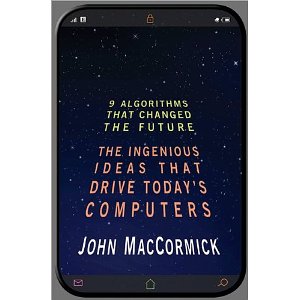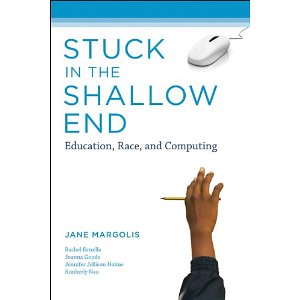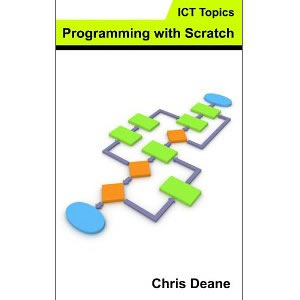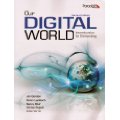Living in a Computing World
Course Information
| Title: | Living in a Computing World |
| Institution: | Metropolitan State University of Denver |
| Course ID: | CS 1030 |
| Semester: | Spring 2013 |
| Meetings: | Tuesdays & Thursdays 2:00PM - 3:50PM |
| Location: | Central 101 |
| Credit Hours: | 4 |
| Prerequisites: | Permission of Instructor |
| Description: | http://LivingInAComputingWorld.org |
| Policies: | http://www.jodypaul.com/cs/liacw |
| Moodle Site: | http://www.jodypaul.com/moodle2/ |
| Instructor: | Dr. Jody Paul (schedule & office hours) |
| E-mail: | jody @ computer.org |
| Office: | Science 1038 (x68435) |
| Campus Mail: | Campus Box 38 |
Course Description
Living in a Computing World enables students to better cope with and prosper in a world where computing is everywhere. It provides the knowledge and skills necessary now and in the future as we become ever more dependent upon computers and technology.
Living in a Computing World addresses how computing enables and empowers innovation, exploration, and the creation of knowledge as well as how it transforms human values and can facilitate social abuses and violations of human rights.
Living in a Computing World empowers students with fundamental skills of the 21st Century. These apply to all disciplines (arts, humanities, business, social and physical sciences, ...) and to all aspects of 21st Century life (health, entertainment, employment, family, law, ...).
Living in a Computing World provides techniques and skills for working in and reasoning about the modern world, but it is not a Computer Literacy course and it is not a Computer Programming course.
Students will learn how to evaluate problems and opportunities as well as the feasibility and social impact of proposed computing solutions and products. Students will design and build personally-relevant creations, both individually and in teams, using a variety of computational tools (abstraction, algorithms, data, modeling, simulation) and iterative creative processes (like those used by artists, musicians and engineers) to translate their ideas into a form that they can share with others.
Textbooks
 The Tao of Computing, Second Edition
The Tao of Computing, Second Edition
by Henry M. Walker
Chapman and Hall/CRC (2012)
ISBN: 1439892512
REQUIRED
 Nine Algorithms That Changed the Future
Nine Algorithms That Changed the Future
by John MacCormick
Princeton University Press (2012)
ISBN: 0691158193
REQUIRED
 Stuck in the Shallow End
Stuck in the Shallow End
by Jane Margolis
MIT Press (2011)
ISBN: 0262514044
REQUIRED
 Can Animals and Machines Be Persons?
Can Animals and Machines Be Persons?
by Justin Leiber
Hackett Pub Co Inc (1985)
ISBN: 0872200027
REQUIRED
Additional resources will be provided in class as handouts and links to online sources.
 ICT Topics: Programming with Scratch
ICT Topics: Programming with Scratch
by Chris Deane
eLearning Tutors Limited (2012)
Digital / Kindle: B007MO6RSG
OPTIONAL
 Scratch 1.4: Beginner's Guide
Scratch 1.4: Beginner's Guide
by Michael Badger
Packt Publishing (2009)
ISBN: 1847196764
OPTIONAL
 Unlocking the Clubhouse
Unlocking the Clubhouse
by Jane Margolis & Allan Fisher
MIT Press (2003)
ISBN: 0262632691
OPTIONAL
 Our Digital World
Our Digital World
by Jon Gordon, et al.
Paradigm Publishing (2012)
ISBN: 0763847569
OPTIONAL
Course Policies
Participation
You are expected to fully participate in class discussions and activities and to prepare for class sessions in advance (reading, preparatory exercises, etc.).
A substantial amount of information will be disseminated during class sessions or on course websites that you will be responsible for knowing whether or not you attended the sessions or accessed the websites. Note in particular that the textbooks and references do not provide all of the information necessary to successfully complete the course requirements.
Practice is vital to applying course knowledge to the real-world. Assignments represent your opportunity to practice applying the concepts and thereby enhance your understanding. Projects are required of all participants. Details of each will be provided in class and on the course support website.
Special Note: Because group work represents a significant aspect of this course, if you think you will drop, do your classmates a favor and drop early. If you drop after you are part of a team, your fellow students are adversely impacted.
Reflection
Every assignment and project turned in must include a mini-write-up labeled “Reflection” (no more than 1 page) in which you reflect on the experience of working on the assignment and report personal insights and observations. This is expected and required whether or not it is mentioned explicitly in the assignment/project description.
Quiet Period
The 24-hour period immediately preceding the due date/time for each assignment and project is considered a quiet period. During that 24-hour interval, no questions directly referencing that specific assignment/project will be addressed by the professor. All students are strongly encouraged to complete significant work on assignments and projects well in advance of this quiet period. The instability and unreliability of most computer systems, especially those used for academic purposes, is another compelling reason to complete all computational work prior to the quiet period.
Collaboration
Collaboration is encouraged as an essential 21st century skill. Collaboration and discussion with fellow students, assistants, and the instructor concerning course information, materials, assignments, projects, proofreading, and concept exploration is strongly encouraged. You are not expected to learn the course content or work on assignments and projects in isolation on your own.
Team deliverables are expected to be a joint effort involving all team members. An overall grade will be assigned for each deliverable that reflects the quality of product. An individual grade for each team member will also assigned for each deliverable. This individual grade will be a combination of instructor assessment and peer assessments. You may be required to assess each team member's contribution (including your own).
While most activities in this course will be collaborative in nature, assignments that are used for individual assessment must be written up on your own, reflecting your individual effort, even if the solution is the result of a collaborative effort. In your write-up, you must credit the people with whom you worked. Unauthorized collaboration during exams is never acceptable.
You must write and turn in a personal reflection for every collaborative as well as every individual effort.
If you consult any sources, you must explicitly note the materials that you used. Turning in work that does not credit collaborators, or includes uncited quotations or references, is considered dishonest and an attempt at fraud.
All incidents of suspected dishonesty will be reported to the department and the Dean of the college. Consequences may include a grade of 0 on the assignment, a grade of "F" for the course, academic probation, or dismissal from the institution. This is a very serious matter and should not be taken lightly. If you have any uncertainty or concerns, please discuss them with your instructor or advisor.
Grading
The final course grade is determined by combining scores on in-class activities, homework, assignments, projects, and exams. You are guaranteed a grade no lower than that computed by the following weighted distribution of total points and conversion of score (percentage of total possible) to letter grade:
70% – Assignments and Contributions
100-90%: A; 89-80%: B; 79-70%: C; 69-60%: D; 59-0%: F
12% – Midterm Exam
18% – Final Exam
Assignments turned in more than 72 hours (3 days) before the stated date/time due will receive 120% of their earned credit up to the maximum possible for that assignment. Assignments turned in within the 72 hours before the stated date/time due will receive their earned credit. Assignments turned in within 72 hours (3 days) after the stated date/time due will receive 70% of their earned credit. Assignments turned in more than 72 hours after the stated date/time due will receive no credit. Unforeseeable situations (illness, crises, emergencies, ...) will be addressed in accordance with University, School, and Departmental policies.
Missing the final exam will result in a course grade of F. Make-up exams will not be accommodated without prior arrangement and written agreement.
Extenuating circumstances (illness, crises, emergencies, ...) will be addressed in accordance with University, School, and Departmental policies.
Official Information
Official policies applicable to all courses: http://cs.msudenver.edu/degrees/courses/policies
MSU Denver College Catalog: http://catalog.msudenver.edu
Official announcements, including Academic Policies and Procedures and Student Rights and Responsibilities
MSU Denver Academic Calendar: http://www.msudenver.edu/MetroCal/tools/acal.jsp
Additional official dates and deadlines, including the last dates to withdraw and receive NC and holidays
MSU Denver Student Handbook: http://www.msudenver.edu/handbook/
Important Metro State and Auraria campus policies and procedures for students